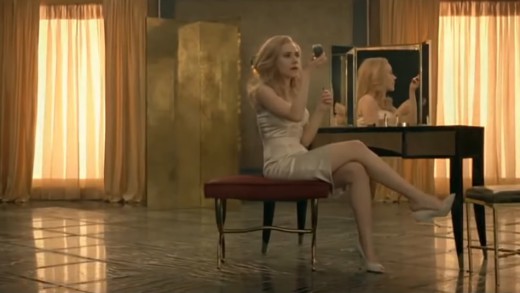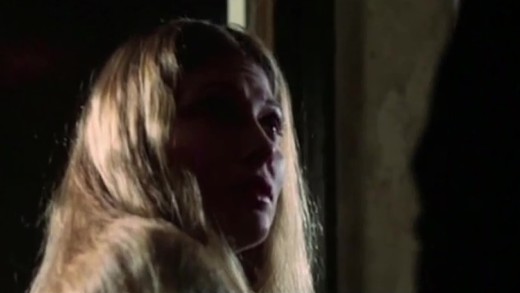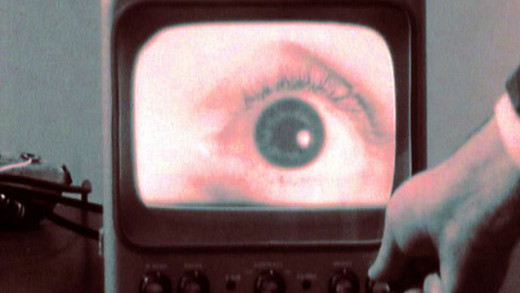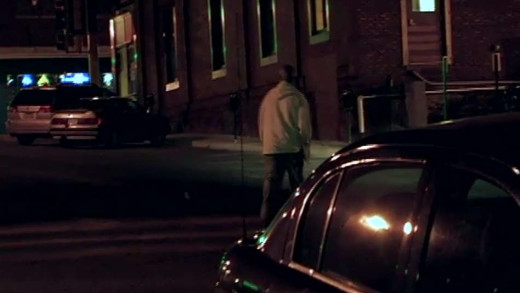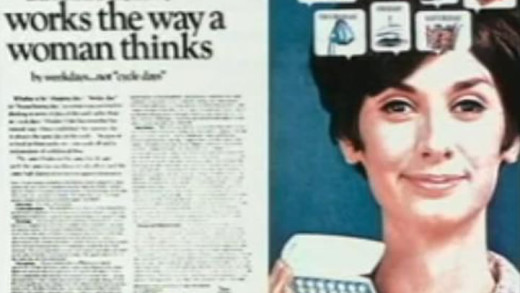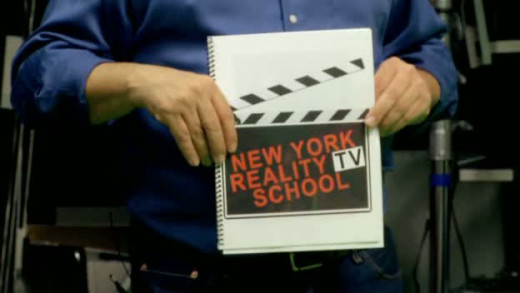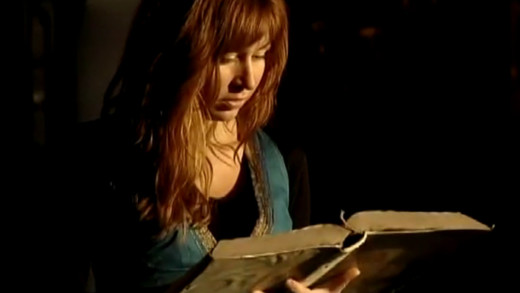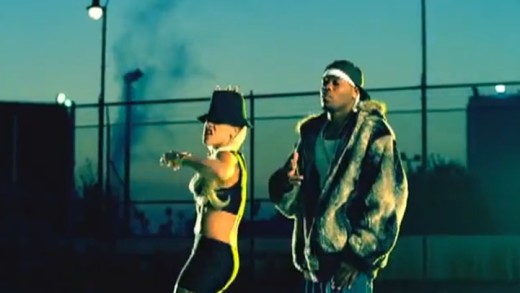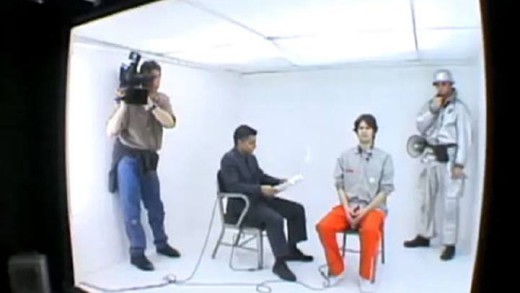Social media networks purport the ability to interact with culture—talking directly to artists, celebrities, movies, brands, and even one another—in ways never before possible. But is this real empowerment? Or do marketing companies still hold the upper hand, as before? Generation Like explores how the perennial quest for identity and connection is usurped in the pervasive game of cat-and-mouse by vast corporate power in the extensive machine for consumerism that is now the online environment. The audience becomes the marketer; buzz is subtly controlled and manipulated by and from real-time behavioural insights; and the content generated is sold back to the audience in the name of participation. But does the audience even think they're being used? Do they care? Or does the perceived chance to be the 'next big star' make it all worth it?
We live in an absolutely saturated media environment of images that span 'real' and fake—whether it's newspaper and tabloid photos, journalism itself, art and culture, or the human body. Images claim to be hardly distinguishable from the originals, while the virtual world is increasingly becoming 'seamless' in the real world. Kids today see a Clown Fish but instead impose their imagery of Finding Nemo. People interact with machines more than they do living beings. The narratives imposed by this technological and media culture are fast seeking to entirely replace the real world with a simulation of it. So what does that mean for the truth? The Industry of Fake explores the shifting boundaries and inequality in journalism and in art, as well as providing a basis to question this culture's fascination with simulacra—a process of mimicry mediated by images that represents the real thing, but is not the real thing. What does it mean if we value our projections or stories about the thing as opposed to the thing in-and-of itself? What does this mean in the real world if we come to value our simulations or representations as more authentic things as opposed to copies or toxic mimics?
DamNation
Travelling across North America, DamNation investigates the growing change in national attitude from strange pride in big dams as domineering engineering projects, to the growing truthful awareness that dams have always been the great killers of rivers, wildlife, the salmon, the forests, coastlines, watersheds. Life is bound to water and health of rivers, and now, dam removal in many forms—including Monkey Wrenching—is reclaiming that life and spreading. Where dams come down, rivers come back, allowing the salmon to return after decades of being concreted out. By making firsthand unexpected discoveries moving through rivers and the landscapes altered by dams, DamNation presents a much-needed metamorphosis in values, from conquest of the natural world to knowing ourselves as part of nature; to respect, and be humbled. With over two million dams in North America alone—75,000 of them over six feet tall—there's much work to be done. Let's get to it.
Fascism Inc. examines a series of historical events to compile a view of the past, the present and the future of fascism and its relation to the economic interests of each era—including the current era. The film travels from Mussolini's Italy, to Greece under the Nazi occupation; the civil war and the dictatorship; and from Hitler's Germany to the modern European and Greek fascism. Following on from the foundations of earlier films such as Debtocracy and Catastroika which described the causes of the debt crisis, the impact of the austerity measures, the erosion of democracy and the sell-out of the country’s assets; Fascism Inc. aspires to continue to motivate anti-fascist resistance movements across Europe, and the world.
For many years, there has been widespread speculation, but very little consensus, about the relationship between violent video games and violence in the real world. Joystick Warriors draws on the insights of media scholars, military analysts, combat veterans, and gamers themselves, to examine the latest research on the issue. By setting its sights on the wildly popular genre of first-person shooter games, Joystick Warriors exploring how the immersive experience these games offer link up with the larger stories this culture tells about violence, militarism, guns, and manhood. It also examines the gaming industry's longstanding working relationship with the United States military and the arms industry, showing how the games themselves work to sanitise, glamorise, and normalise violence while cultivating regressive attitudes and ideas about masculinity and militarism.
The Society of the Spectacle is a film based on the 1967 book of the same name by French political theorist and philosopher, Guy Debord. The work traces the development of modern society, in which Debord argues that authentic social life has been replaced with representations, and that the history of social life can be understood as "the decline of being into having, and having into merely appearing." This emerges from and gives rise to a pervasive and all encompassing spectacle in which relations between commodities have supplanted relations between people, in which "passive identification with the spectacle supplants genuine activity." The film weaves the text of the original book with modern-day imagery, illustrating many elements of the spectacle, including that "the spectacle is not a collection of images, rather, it is a social relation among people, mediated by images." This makes the material hard to decipher at times, especially with conflicting subtitles between languages: but this is part of Debord's goal, to "problematise reception" and force the viewer to be active rather than passive. In addition, the words of some of the authors are "détourned" (hijacked) through deliberate misquoting. The result is a foundational work on the concept of the spectacle and its characteristics, to encourage critical thinking, to build and extrapolate critiques to apply to the wider social scale.
For the past 40 years, the war on drugs has resulted in more than 45 million arrests, one trillion dollars in government spending, and the arrival of the United States as the world's largest jailer with almost 2.3 million individuals incarcerated. Yet for all that, drugs are cheaper, purer, and more available than ever. Filmed across the country, The House I Live In provides the experience firsthand of those on the front lines—from the dealer to the grieving mother, the narcotics officer to the senator, the inmate to the federal judge—and offers a penetrating look at the profound human rights implications of the so-called war on drugs.
Based on interviews conducted with hundreds of young women, Flirting With Danger examines how the wider culture's frequently contradictory messages about pleasure, danger, agency, and victimisation enter into women's most intimate relationships. The result is a candid and nuanced look at how women are forced to grapple with deeply ambivalent cultural attitudes about sexuality and relationships. These interviews are essential viewing for tackling the problematic issues surrounding consent, coercion and sexual violence throughout the culture.
Rape Myths on Trial is a provocative presentation by a career criminal prosecutor and advocate for victims of sexual violence, Anne Munch. She examines how cultural attitudes shape the outcomes of rape and sexual assault cases by drawing on years of experience prosecuting sex crimes, showing how rape cases often turn on the involvement of an "unnamed conspirator" -- the often-unexamined complex of myths and stories we tell ourselves as a culture about sex, gender, power, and responsibility. By using examples from real cases, and harrowing evidence from actual emergency calls, Munch reveals how these assumptions that juries bring into the courtroom often stack the odds against victims, and at the same time challenges us to think critically about how our own assumptions might unintentionally reinforce victim-blaming. The result is a stunning look inside the criminal justice system and an incisive analysis of this culture's warped views of women's sexuality and rights as human beings.
The myth that humans are superior to all other life forms is a fundamental and unquestioned premise of dominant culture. It is an old historical idea, rooted in colonialism, and is deeply embedded in religion and science. It is one of the root causes for the destruction of the natural world, animal cruelty, war, the extinction of species and other immense problems. The Superior Human? challenges this arrogant and self-destructive ideology; unwinds the myths, using examples and common sense.
The huge and complex problems of today often instil doubt and fear that everything is futile. Yet by analysing how the power of media, schooling and parenting have moulded us, #ReGENERATION helps us start to comprehend what we must change—both as a generation and as a culture. We see how the average family spends at least four hours a day in front of the TV. Internet and video games are not included in this figure. So guess what is shaping us? This film examines the corporate forces that deeply influence all of us, but particularly the young, providing insights into how the politics of apathy is perpetuated, and how we can turn this around into activism, if and when we are willing.
The Purity Myth takes a look at the resurgence of a movement of abstinence, brought about by a powerful alliance of religious ideologues, right-wing politicians, conservative media pundits and policy intellectuals who have been exploiting irrational fears about women's sexuality. From daddy-daughter "purity balls," taxpayer-funded abstinence-only curricula, and political attacks on 'Planned Parenthood,' to recent attempts by legislators to de-fund women's reproductive healthcare and narrow the legal definition of rape, The Purity Myth identifies the single false assumption underlying this huge push: that the worth of a woman depends on what she does—or does not do—sexually. This film also argues that the health and well-being of women is too important to be left to figureheads bent on vilifying feminism and undermining women's autonomy.
How does the military train the solider of tomorrow? Video games. The most popular games are those that replicate as close as possible the war events as seen on the news. Such games now far outpace the biggest Hollywood blockbuster movies, popular music, and best-selling books, combined. What does this complete immersion in high-tech war mean for our political culture? As well as those directly affected by state violence? What does it mean when the technological sophistication of modern militarism become forms of mass entertainment? Returning Fire profiles three artists and activists that decided these questions needed to be answered. We see how Anne-Marie Schleiner, Wafaa Bilal, and Joseph Delappe moved dissent from the streets to the screens, infiltrating war games in an attempt to break their hypnotic spell. The results ask all of us--gamers and non-gamers alike--to think critically about what it means when drones and remote warfare become computer games and visa versa. Can we reflect on our capacity to empathise with people directly affected by the trauma of real war?
Earth at Risk documents the first conference of the same name convened in 2011 by featured thinkers and activists who are willing to ask the hardest questions about the seriousness of the situation facing life on the planet today. Each speaker presents an impassioned critique of the dominant culture, together building an unassailable case that we need to deprive the rich of their ability to steal from the poor, and the powerful of their ability to destroy the planet. Each offers their ideas on what can be done to build a real resistance movement—one that can actually match the scale of the problem. To fight back and win. Literally, the whole world is at stake.
The dominant culture measures itself by the speed of "progress." But what if this so-called progress is actually driving the physical world towards full-force collapse? Surviving Progress shows how past civilisations were destroyed by progress traps—alluring technologies and belief systems that serve immediate needs, but ransom the future. As the total destruction of the environment accelerates and those in power cling to their power ever more tightly in denial, can this globally-entwined civilisation escape a final, catastrophic progress trap?
All Watched Over By Machines Of Loving Grace is a series of films about how this culture itself has been colonised by the machines it has has built. The series explores and connects together some of the myriad ways in which the emergence of cybernetics—a mechanistic perspective of the natural world that particularly emerged in the 1970s along with emerging computer technologies—intersects with various historical events and visa-versa. The series variously details the interplay between the mechanistic perspective and the catastrophic consequences it has in the real world.
END:CIV
By examining the modern culture of industrial civilisation and the persistent widespread violence and environmental exploitation it requires, END:CIV details the resulting epidemic of poisoned landscapes and shell-shocked nations, while further delving into the history of resistance and the prospect of fighting back against such abuse. Detailed is an overview of the environmental movement analogous with the historical whitewashings of the supposedly 'pacifist' social struggles in India with Gandhi and Martin Luther King in the United States; the rise of greenwashing and the fallacy that all can be repaired by personal consumer choices. Based in part on 'Endgame,' the best-selling book by Derrick Jensen, END:CIV asks: If your homeland was invaded by aliens who cut down the trees, poisoned the water, the air, contaminated the food supply and occupied the land by force, would you fight back?
The Bro Code unpacks and takes aim at the forces of masculinity that condition boys and men to fundamentally dehumanise and disrespect women. The film breaks down a range of contemporary media forms that are saturated with sexism—movies and music videos that glamorise misogyny, pornography that trades in the brutalisation and commodification of women, comedy routines that make light of sexual assault, and a slate of men's magazines and TV shows that propagate myths of what it means to be a man in this culture: that it's not only normal, but "cool" for boys and men to control and humiliate women. There's nothing natural or inevitable about this mentality. And it's extremely harmful in the real world. By setting the myths against reality, The Bro Code challenges young people to step up and fight back against this culture, to reject the fundamental idea that being a 'real man' means disrespecting women.
Subconscious War is a video essay exploring the influences of media and the culture of violence on reality, and the cultivation of collective values in society. The film contrasts the writings of Aldous Huxley and Neil Postman's grim assessments; relating the concepts of works such as 'Brave New World' and 'Amusing Ourselves to Death' to the current cultural influences that foster today--corporate media and indeed media saturation, video games, television, and a pervasive technoculture, for example. What is being created? And what sort of people are being cultivated by this culture? Who benefits?
All over the world, species are going extinct at an extraordinary rate--currently around 250 per day--a scale never before seen. Call of Life investigates the growing threat to Earth’s life support systems from this unprecedented loss of biodiversity by exploring the causes, scope, and potential effects of this mass extinction. The film also looks beyond the immediate causes of the crisis to consider how our cultural and economic systems, along with deep-seated psychological and behavioral patterns, have allowed this situation to develop and be reinforced, and even determine our response to it. Call of Life tells the story of a crisis not only of nature, but also of human nature; a crisis more threatening than anything human beings have ever faced...
With economic collapse besieging the United States, domestic violence statistics show a sharp increase in violence against women. States are closing shelters and cutting support programs, and the culture ignores domestic violence, except when celebrities are involved on TV. In the meantime, more spouses have been killed by their partners in the past several years than soldiers have been killed in Iraq. Power and Control addresses this life and death issue during a time of urgent crisis, a timely and comprehensive exploration of physical and emotional abuse in dominant culture, as refracted through the story of Kim Mosher, a mother of three who has recently left her abusive husband. As Kim and her fragile daughters take up residence in a domestic violence shelter, the film follows the harrowing struggles in a single-parenting survivor's quest to find work, housing and peace of mind. We also meet Kim's husband, Josh, himself a survivor of abuse. His attempts to explain his behaviour are troubling--shocking in the context of the story's final twist. The multi-level narrative also examines the root causes of domestic violence and the solutions that have evolved to stop it, celebrating the battered women's movement activists who demanded revolutionary change in the 1980s, and examining alternative approaches now being advocated.
Author and activist Jean Kilbourne analyses the depiction of women in advertising and media by decoding a large array of print and television ads. What is revealed is a torrent of stereotypes; sexist and misogynistic images and messages; laying bare a world of frighteningly thin women in positions of subservience; collectively, the restrictive code of femininity that works to undermine girls and women in the real world. By examining these messages, Killing Us Softly asks us to take advertising seriously, and to think critically about its relationship to sexism, eating disorders, violence against women, popular culture, and contemporary politics.
Filmmaker Darryl Roberts goes on a five year journey to examine this culture's burgeoning obsession with physical beauty and perfection, showing how increasingly unattainable images contribute to the rise in low self-esteem, body dismorphia, and eating disorders for young women and girls who also happen to be the beauty industry's largest consumers. In almost 40,000 media messages a year, young people are being told that unless you look like supermodels and rock stars, you're not good enough for anyone. In 2004 alone, people across the United States spent $12.4 billion on cosmetic surgery. America the Beautiful explores why these people are spending so much money to cover up their discontent that is mainly driven by advertising. What are the true costs of this culture's obsession with youth, plastic notions of beauty, and impossibly slender physiques? Who actually benefits from this high-priced journey towards a fake ideal, and does it justify an entire nation's psychosis?
Poisoned Waters investigates some of the root causes of what we see worldwide with ecological collapse, dead-zones and pollution effecting oceans, rivers and watersheds. With a focus on major waterways in the United States such as the Chesapeake Bay and Puget Sound, the film follows the culmination of decades of evidence that today's systemic and growing environmental collapse comes not only from the toxic activities of industry, agriculture and massive suburban development; but also from the permeated satiety of chemicals in prolific consumer products such as face-creams, deodorants, prescription medicines and household cleaners. This is a startling reminder of the compounding threat facing our world and the need to act imperatively.
Starsuckers
By planting a variety of fake celebrity-related stories in the UK media and having tabloid newspapers accept them without corroboration or evidence, Starsuckers navigates through the shams and deceit involved in creating a pernicious celebrity culture, uncovering the real reasons behind the addiction to fame and the corporations and individuals who profit from it.
Red Moon
With humour and refreshing candour, Red Moon provides a fascinating, often ironic, take on the absurd and frequently dangerous cultural stigmas and superstitions surrounding women's menstruation. As educational as it is liberating, the film functions as both a myth-busting overview of the realities of menstruation, and a piercing cultural analysis of the ways in which struggles over meaning and power have played out through history on the terrain of women's bodies.
Generation M looks at misogyny and sexism in mainstream media, exploring how negative definitions of femininity and hateful attitudes toward women get constructed and perpetuated throughout popular culture. The film tracks this across a broad and disturbing range of media phenomena: from the hyper-sexualization of commercial products aimed at girls, to the explosion of violence against women in video games aimed at boys; from the hysterical sexist rants of popular hip-hop artists and talk-radio shock-jocks, to the continually harsh, patronizing caricature of women found in virtually every area of media. Generation M posits the consequences of misogyny in all of its forms, showing that when we devalue more than half the population based on gender, we harm everyone—boys and men, women and girls alike.
This film explores what affect the web is having on our society, as seen through the eyes of "the greatest Internet pioneer you've never heard of." Josh Harris--often called the "Andy Warhol of the Web"--founded a website during the renowned dot-com boom of the 1990s which was the world's first Internet television network. This concept was way ahead of its time. Using this platform, before broadband, a vision of that future was exemplified at an underground bunker in New York City where over 100 people lived together completely on camera, non-stop and unedited for 30 days over the millennium. These happenings, documented through We Live In Public, serve as a powerful analogy for the Internet as it's now known today and the price we pay for living in its 'public.' It shows the costs of willingly trading privacy and sanity for a constant voracious audience, attention, and the pursuit of celebrity, in an online world of pervasive surveillance.





